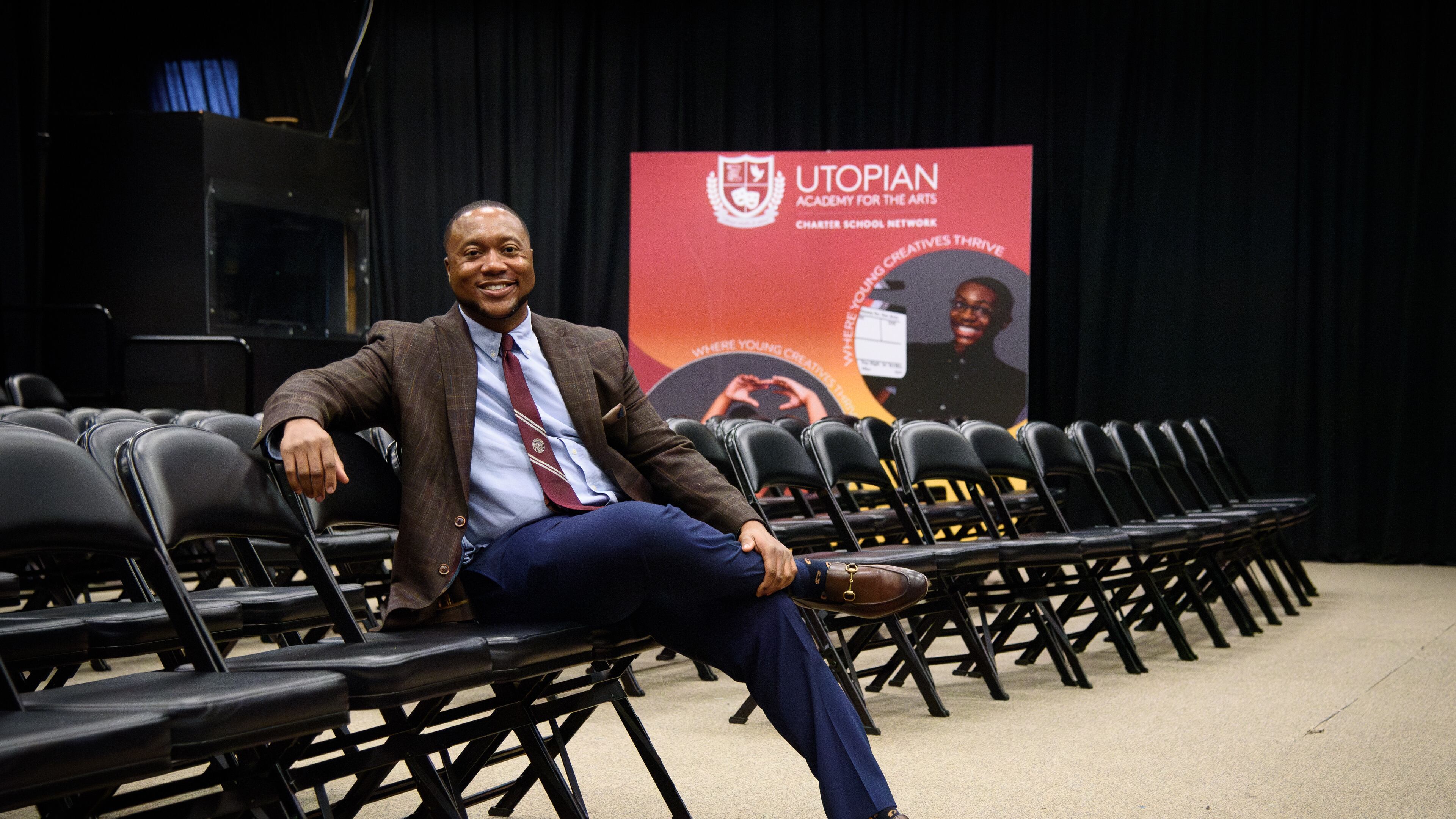Education innovator aims to produce ‘future leaders of color’

“A testament of faith” is how Artesius Miller, 37-year-old founder and CEO of the Utopian Academy for the Arts Charter School Network, describes his journey establishing the institution.
“There was no textbook that could prepare any leader for what I experienced as a brand-new educational leader in this line of work,” he said.
In August 2014, roughly 200 sixth and seventh grade students, as well as teachers and administrators, showed up at Utopian Academy for the Arts charter school in Riverdale for its inaugural year as an educational institution and were turned away by members of the Riverdale Fire Department. Two weeks later, the school doors were chained shut and school officials were told by the city of Riverdale that it didn’t have a business license to operate, which isn’t a requirement for a Georgia public school.
“We lost 65 students in our first two weeks, which brought a financial deficit of over three quarters of a million dollars,” said Miller. “We had folks across the state and the city that thought we wouldn’t live to see 10 months.”
A decade later, under Miller’s leadership, Utopian Academy has grown to include four schools that have served a combined total of 3,500 students, and when classes begin Aug. 1, its high school in Morrow adds a 12th grade, making Utopian a fully operational K-12 institution.

The road to success hasn’t been without its challenges. Miller had to file an emergency injunction and temporary restraining order against both the Clayton County Board of Education, which three times denied a Utopian petition to open, and the city of Riverdale — with leaders from both entities blocking Utopian’s launch.
Clayton County Board of Education Chair Jessie Goree said she was the sole holdout when the board tried to stop Utopian from opening partly due to concerns that it would siphon money from the public-school system. Now “we’re very supportive of them as a charter school,” she said, noting that her granddaughter is a rising 11th grader at Utopian high school.
Inspired to be an educator by his grandmother, a kindergarten teacher in Gary, Indiana, Miller first got a degree in economics at Morehouse College, then a master’s in education leadership from Columbia University and a doctoral degree in educational administration and policy from the University of Georgia. He’d been preparing for this moment. Miller knew the time was right for a new school in the county. He envisioned one that focused on the arts and its real-world applications in the entertainment industry.
“Utopian Academy for the Arts started as a single-site charter school in 2014 with the mission and vision to give students across Clayton County — the fifth-largest school system — access to arts-based education and also to give parents faith back in public education after the loss of accreditation,” said Miller, referring to Clayton County Public Schools losing accreditation from the Southern Association of Colleges of Schools (SACS) in 2008. (It was restored by SACS, now Cognia, on a probationary basis in 2009 and eventually fully restored.)
The mission, he said, is to give students “access to a high-quality education that would also lend them to discover talents many of them never knew that they had in arts.”
Utopian Academy now consists of four schools: the flagship elementary for kindergarten through fifth grade and a middle for sixth through eighth graders, both in Ellenwood; a high school for ninth through 12th grade in Morrow; and Utopian Academy for the Arts at Trilith in Fayetteville for sixth and seventh graders.
A large part of Utopian’s resources come from partnerships like the one with Trilith Studios, which gives students opportunities to study film and television production, animation, coding and design, digital art and design and more.
“We have a $6 billion industry that’s in our backyard that’s saying, ‘We don’t have a workforce to (fill) jobs,’ that has a demand that’s outweighing our reach,” said Miller. “We’ve created a pipeline … of the next wave of screenwriters, the next wave of postproduction experts, the next wave of directors, actors.”
Other Utopian partners include the Alliance Theatre, the Atlanta Ballet, the Atlanta Music Project, rap artist and actor Ludacris, singer Musiq Soulchild and the Steve Harvey Foundation.

Opportunities for Utopian students have come in the form of scholarships at leading colleges and universities such as Yale University, Spelman College and Morehouse College. Over the years, students have landed professional roles in the entertainment industry such as with the Netflix series “First Love” and the Alliance Theatre production of “A Preacher’s Wife.”
Utopian’s story, Miller said, is one of grit and faith. Those who work under and alongside Miller also use those same words to describe Miller, while also pointing to his optimistic spirit and compassionate nature. “He listens to things we have to say and he deals with it on an individual basis,” said Tonia Jackson, a professional actress and acting teacher at Utopian’s high school in Morrow. “I think it’s fascinating that he’s been able to keep all of the balls in the air. He has so much faith and so much optimism.”
Miller’s spirit trickles down to his staff, said Selina Walton, founding elementary school principal at Utopian. “He’s an amazing visionary who lends support and a helping hand any time it’s needed,” said Walton, who is in her fourth year with the institution. “The scholars know him by name. He comes to all of our performances and programs.”
One recent example of that came during a spring pep rally in the elementary school gymnasium when Miller joined faculty and staff to show off his dance moves as the students moved and sang along to some familiar hits.
Miller and his staff’s dedication is paying off. In 2013, Utopian Academy became the first charter school authorized by the State Charter Schools Commission of Georgia. In 2015, Gov. Nathan Deal signed into law House Bill 372, known as the Utopian Academy for the Arts Act, to protect state-authorized charter schools from local officials.
And students are the ones reaping the benefits. Utopian Academy was one of two schools named 2023 Annual Georgia Charter School of the Year by the Georgia Charter Schools Association. In 2023, after one year of operations, Utopian high students exceeded county scores for content mastery and state scores for promotion readiness. The same year, Utopian elementary school students exceeded county scores on the Milestones exam.
Meanwhile, the demands Miller balances extend beyond the walls of Utopian schools. The Southwest Atlanta native and North Atlanta High School graduate also is a history-maker of sorts in a different capacity. In 2024, Miller became the first Black person to chair the board of the Technical College System of Georgia. He’d previously served as vice chair after being appointed in 2019 by Gov. Brian Kemp.
“I’m humbled, but it’s a lot of pressure I feel like I have,” said Miller, an adjunct professor of education at Morehouse College, his alma mater. “For there never to have been a person of color, it’s concerning to me, but I’m grateful.”
It’s a charge he doesn’t take lightly — just as he doesn’t with his leadership of Utopian. “To be in a position to lead an institution, to be in a position to start an institution not just to serve Black and brown kids, but to serve all — I think about that,” said Miller.
“To have a seat at the table … in a position of leadership, it shows that we’ve advanced,” he said of his Technical College System of Georgia role. “It’s a blessing to see that we are advancing — although we should have been here a long time ago.”
Miller continued, “I’m very humbled because I never would have thought that these doors would have been opened, and I would be the person that would be leading the charge to do that work.” He said he wants to make sure “representation is there” by opening “doors for future leaders of color.”
Some of those leaders, Miller believes, will have their start at Utopian Academy for the Arts.
“I’m extremely grateful for the faith that I had in God and my team,” Miller said, “and just knowing that we would show the successes and the validity of why a school like Utopian is necessary to exist.”


